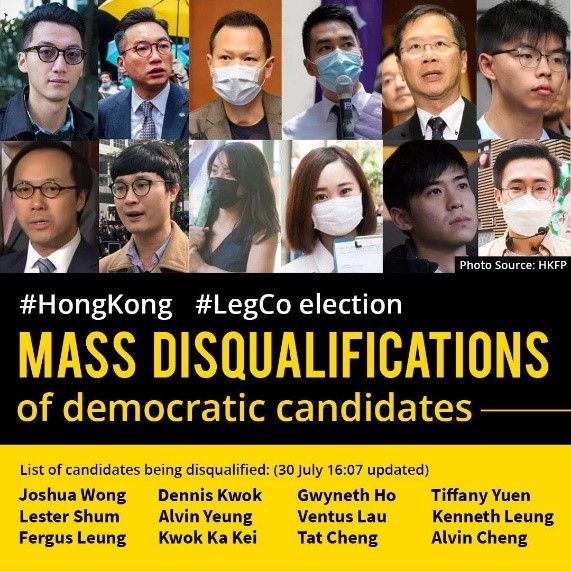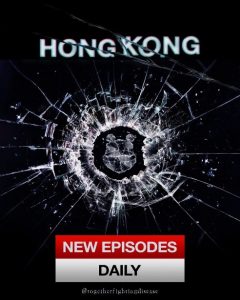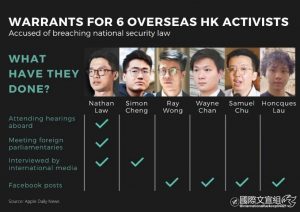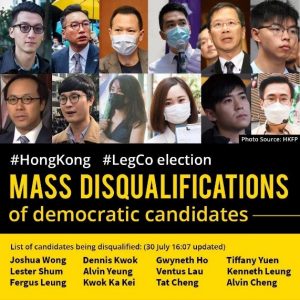
Hong Kong currently sits at the center of the Chinese world. Long a meeting place of East and West some now call it the Berlin of the new Cold War or a battlefield of ideologies between the authoritarian Chinese Communist Party and liberal values of an open society.
This summer does not have the mass demonstrations, nor of the tear gas, nor the flaming barricades of last year but the tensions remain high and the city divided. The first month of the National Security Law (NSL) has been a series of blows to the liberal and open ideals which so many in Hong Kong and around the globe cherish. The last week of July has seen a dramatic downturn in political freedoms.
Knock upon Knock
Since the success of broadly anti-government protest candidates in the November 2019 District Council elections there has been a concerted effort to muster all possible votes for the September Legislative Council elections. This effort involved holding a well order “primary” style of election via physical polling booths early in July to help rank the many opposition candidates. Although called illegal by some Beijing and local government supporters and possibly even in breach of the NSL, the primary polling was not legally binding and did not actually restrict anyone from applying to stand as a candidate but it did attract over 610 thousand Hongkongers who wanted to express their preferences of candidates.
That was all in vain though. The electoral commission asked numerous pro-democracy or anti-government candidates to state their position regarding the NSL and what political positions they would promote during the election. The outcome of this became clear the day before applications for candidates closed with 12 candidates being disqualified from running in the formal election. The disqualified candidates include four currently serving Legco delegates, Alvin Yeung, Dennis Kwok, Kwok Ka-ki and Kenneth Leung. Whether they can remain as existing Legco members remains unclear.
The disqualifications rightly caused outrage and seemed to confirm the worst fears that the NSL was rushed through to ensure it could be used to stifle open elections in September but the following day, Chief Executive Carrie Lam went one step further and postponed the election by a year. The reason given was of course Covid-19. Hongkong has seen a relatively dramatic spike in infections and deaths over the past few weeks, well below levels seen in Europe or the Americas but high enough to force the government to bring in more social distancing measures and draconian restrictions on restaurants. There is certainly a strong case to make that Hong Kong should delay the election, they are not the first government to do so, but other East Asian countries, South Korea, Taiwan and Singapore have all been able to hold elections during the pandemic. Could Hong Kong have followed their example? Perhaps, but few will believe that Carrie Lam and her team made much effort to think of alternative arrangements to run the election. Far easier to postpone a year and live with the consequences. Afterall which plans have not been impacted by Covid19 this year?
If the government commanded the trust of the electorate then a delay could have been much more palatable but with distrust of the Chief Executive and her government running so high then everything she does will be read in a negative light. While the pro-democrats expected to do well, even contemplating the possibility of a majority in Legco it is too simplistic to look at this as a purely political delay to avoid a huge election defeat for the government. The Legco voting system is different from the District Council elections and it shouldn’t be forgotten that the government candidates still polled around 40% of the votes in November even though they lost a landslide of seats given the first past the post nature of that election.
The concerns around the delay, independent of politics, are best summarized by the Hong Kong Bar Association. In a recent statement they highlighted the opaque decision making process, the lack of consultation with civil society, the choice of 1 year as opposed to a few months, and the legal problems such a delay causes which the government addressed by just throwing them to the National People’s Congress to sort out the constitutional implications.
Beyond the elections the worst of the NSL to date was on display. Late July saw 4 young activists, ranging from 16 years to 21, subject to late night arrests under the NSL because of comments they had made on social media posts. The posts had promoted pro-independence political ideas and had called for the establishment of a Republic of Hong Kong. A further 6 activists, all currently overseas, have been put on a wanted list by the Hong Kong Police and are accused of breaching the NSL by virtue of social media posts and contact with foreign media and foreign politicians.
NSL in action
The National Security Law has been actively used by the Hong Kong government and police to restrict political rights and freedom of speech
- WARRANTS FOR 6 OVERSEAS HK ACTIVISTS
- List of candidates being disqualified
Source: Telegram online protest channels
If all this was not enough HKU Associate Professor Benny Tai was sacked by the university over his criminal conviction for his involvement in organizing the Occupy Central protests of 2014. Although the University Senate rejected calls for his dismissal the governing council voted to remove him. The move was broadly seen as yet another blow to academic freedom in Hong Kong.
White Terror, Black Mirror

The speed of change in Hong Kong is frightening. There has been a “shock and awe” start to the implementation of the new law during the first month. Last year during the protests many on the protest side employed somewhat hyperbolic language to describe what was happening in Hong Kong. But the rapid restrictions on freedoms of thought and speech have seen one creative person mimic the Black Mirror logo for Hong Kong. The Black Mirror television series looks at varying uses of technology which result in a dystopian future of control and surveillance, but which seems every more prescient in modern day China. The Hong Kong logo replaces the bullet shot glass happy face with Winnie the Pooh, the derogatory symbol of Xi Jinping, and of course banned in China. Satire and mockery have no place in China. And as the graphic states, there really do seem to be new episodes daily.
While the Winnie the Pooh head mocks Xi Jinping, a man crying out to be mocked, this can obscure what is playing out in Hong Kong on a daily basis. It has been very easy to present Carrie Lam and her administration as puppets of Beijing following orders laid down from Zhongnanhai or the Liaison Office but that is too lazy an approach. Of course, Beijing is taking a much harder line towards Hong Kong but when it comes to enforcing the NSL it is the HK Police Force who are the willing instrument. Beijing has provided them with a range of new powers and the HKPF are keen to use them. Afterall, they are legal. There is no lawbreaking going on, but there is now a legally and politically sanctioned round up of the leaders and foot soldiers from last years’ protests.
Last year the protestors made it very clear their contempt for the Police and their families. Doxxing, that it the online publication of personal information, of police officers and their families was commonplace. Intimidation of police families in their homes via chanting and laser pointers shone at windows, bullying of police officers’ children at school only poisoned an already difficult situation. Under the NSL the police now have the legal powers to go after all those students and youngsters who stood across the barriers from them last year and since the law criminalizes even having pro-protest slogans on your possession many students are rightly worried. Neither the Hong Kong government nor police are in a mood to show any mercy. They have never accepted any responsibility for the unrest of last year. The entire period is now painted as one of foreign backed chaos explicitly designed to overthrow the government and now the clampdown is in full swing.
The world watches
The global pushback against Beijing’s actions in Hong Kong continue. The US has now formally revoked Hong Kong’s special trading status and more countries have suspended or cancelled their extradition treaties with Hong Kong. But it is Britain’s continued willingness to offer citizenship to Hong Kong BNO passports which stands out amongst the global outrage. As the former colonial power and signatory of the still binding Joint Declaration perhaps that is how it should be although such a forceful position of the UK government is still surprising given their largely compliant stance towards China historically and a generally dim view of immigration under Brexit.
Boris Johnson’s stance is welcome support for the people of Hong Kong but only a portion will ever likely benefit from it. The strong stance taken by Britain has not gone without the requisite vitriol from Liu Xiaoming, the suave Chinese ambassador to the Court of St James. Liu has called out the UK for “poisoning the atmosphere” of relations between the two countries. He claims that China has done “nothing to weaken mutual trust” between the nations and the UK, along with other Western powers is responsible for spreading “the lies of the century” around the illegal imprisonment, forced sterilization and other brutal treatment of the Uighurs of Xinjiang. He was recently exposed on a BBC morning talk show being unable to explain what was going on in Xinjiang when show footage of prisoners shaved and blindfolded and then a recording of a women explaining the brutal treatment she received while in detention. Liu was shaken and angry.
The UK government’s reversal of its stance towards Huawei’s involvement in Britain’s 5G infrastructure only inflames Liu even more. To listen to him you would think he is the leader of the UK state and that government policy must first be approved by him. He seems to think that Britain has no right to change its mind about a commercial contract nor be free to choose its own telecom suppliers. Liu’s threats towards the British government’s stance regarding Huawei provides ample evidence of why countries should be cautious about Chinese involvement in critical infrastructure. While Liu decries Britain’s actions in HK as interference in China’s domestic affairs Liu feels he is free to comment and threaten consequences when Britain makes a decision that China doesn’t like. It also makes one wonder if Huawei is only a private company, as the company and the Chinese government claim, then why should Chinese diplomats be so involved in ensuring the commercial success of the company.
Liu’s actions and response over Britain’s position on Hong Kong though paints an alarmingly clear picture of how today’s China under Xi Jinping sees its global role and position. To criticize China is to interfere in its domestic affairs. To change your mind on some matter relating to China invites threats and retaliation. These columns have lamented the lack of global leadership from the United States. But democracies around the globe need to be aware and responsive to the Chinese challenge.
Hong Kong is proving a testing ground for how the rest of the world responds as China’s squeezes the city. The sad reality is that Hong Kong is China’s Hong Kong and there is very little which can be done to reverse the course which Beijing has chartered but which Hongkongers are following through on. But the city serves not only as a warning of how China operates but shows the determination it has to follow through on what it considers as its core interests even in the face of global opposition. Xi Jinping sees Hong Kong as a place that needs brought into line, that same thinking is no doubt at work when he looks towards Taiwan. The Hong Kong story is far from finished but it won’t be the last chapter either in Xi’s grand ambition.
カテゴリー
最近の投稿
- 習近平の思惑_その1 「対高市エール投稿」により対中ディールで失点し、習近平に譲歩するトランプ
- 記憶に残る1月
- 高市圧勝、中国の反応とトランプの絶賛に潜む危機
- 戦わずに中国をいなす:米国の戦略転換と台湾の安全保障を巡るジレンマ
- トランプ「習近平との春節電話会談で蜜月演出」し、高市政権誕生にはエール 日本を対中ディールの材料に?
- A January to Remember
- Managing China Without War: The U.S. Strategic Turn and Taiwan’s Security Dilemma
- 「世界の真ん中で咲き誇る高市外交」今やいずこ? 世界が震撼する財政悪化震源地「サナエ・ショック」
- 中国の中央軍事委員会要人失脚は何を物語るのか?
- 個人の人気で裏金議員を復活させ党内派閥を作る解散か? しかし高市政権である限り習近平の日本叩きは続く





